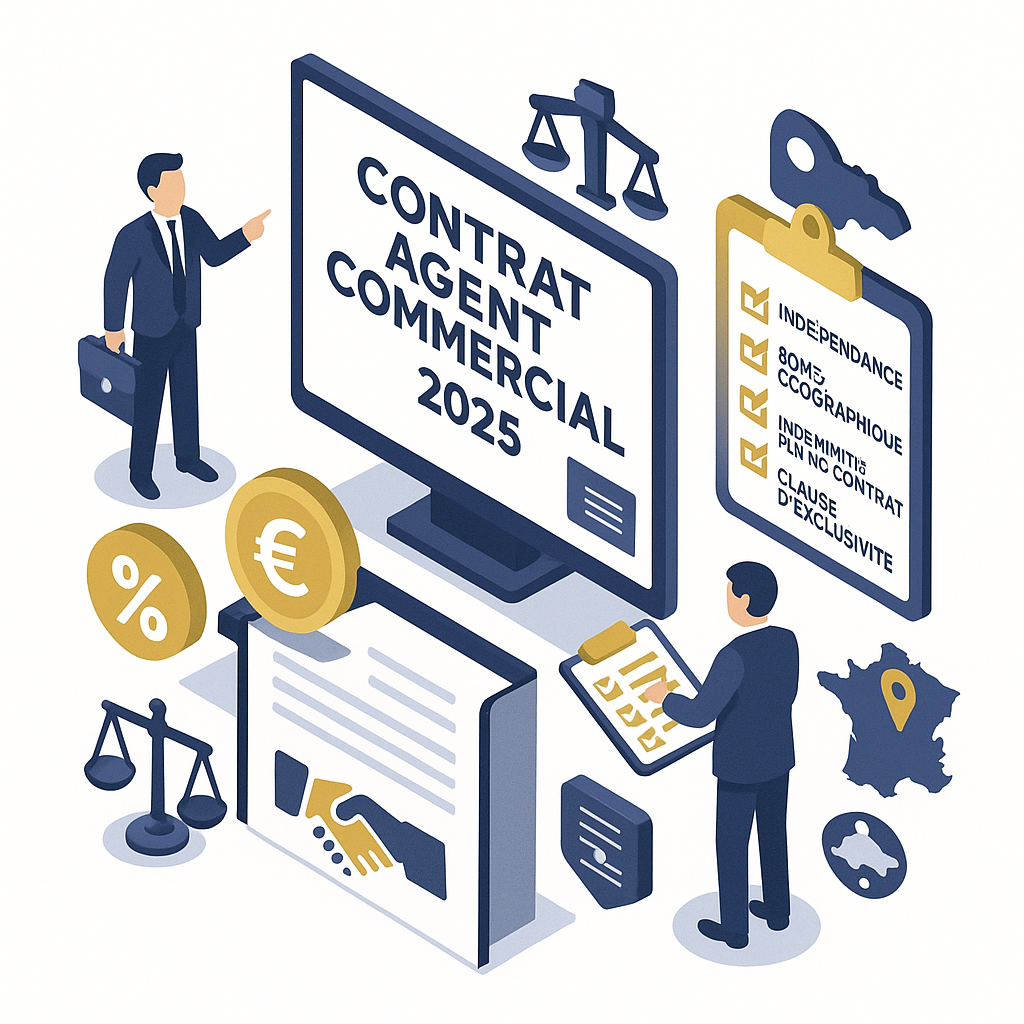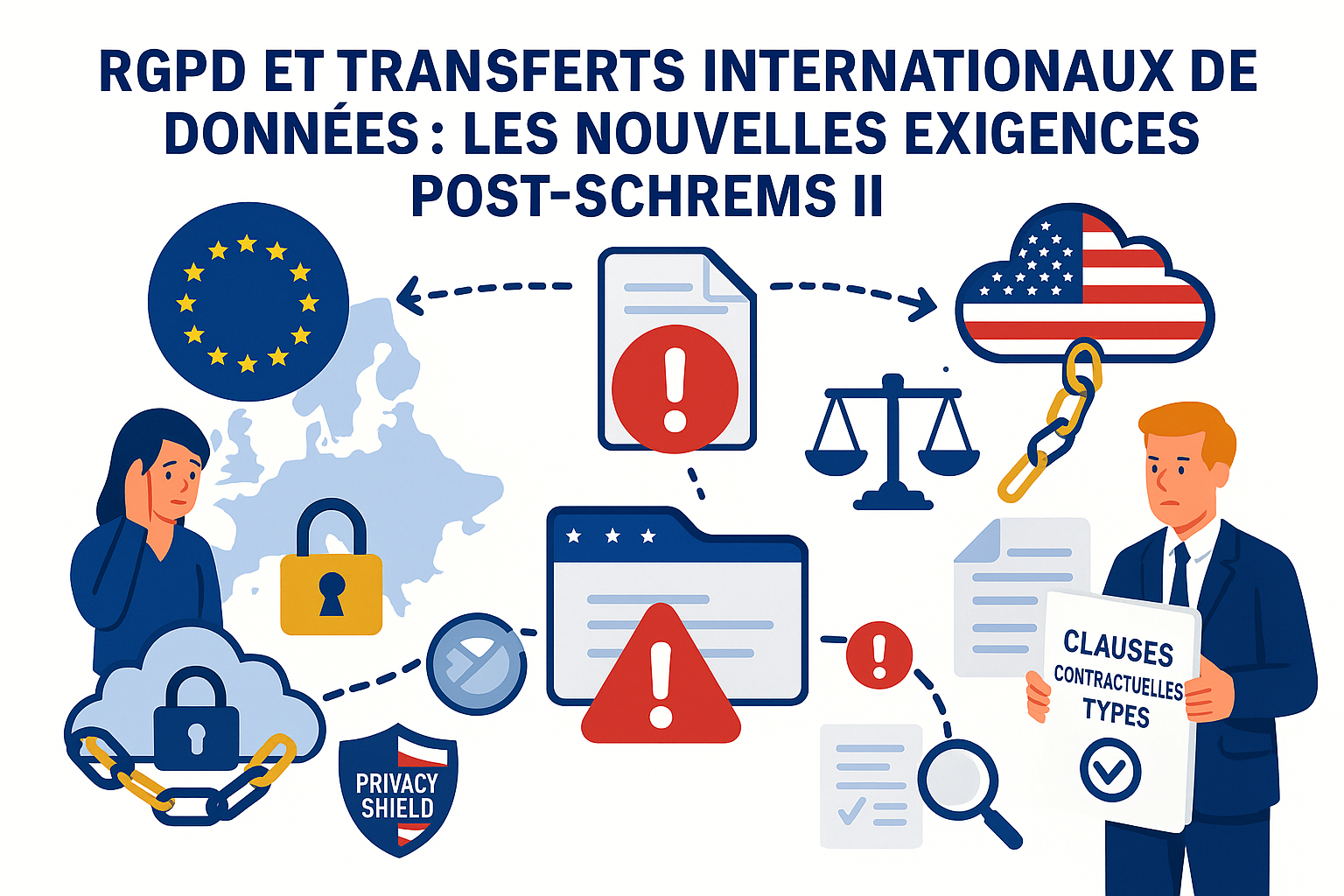Drawing up a sales agent contract is a crucial step in implementing an effective and secure distribution strategy. All too often, companies underestimate the importance of this legal formalization, contenting themselves with generic models or imprecise clauses that become a source of costly litigation.
In 2025, in the face of increasingly refined case law and sales agents who are better informed of their rights, rigorous drafting in line with French law is an absolute necessity for principals.
If you're looking for a commercial agent lawyer, contact me!
Mandatory information in a commercial agency contract
To comply with the French Commercial Code, a commercial agency contract must contain certain terms and conditions, and offer optimum legal security to the parties. Although French law does not formally require the drafting of a written contract, basic prudence dictates that this complex and highly regulated commercial relationship should be formalized in writing.
The first essential point concerns theprecise identification of the parties. Beyond the obvious, this identification must be complete and detailed, specifying the exact legal status of the agent (natural person or corporate form), his or her registration number in the special register of commercial agents, and the powers of the signatory when the principal is a legal entity. Incomplete identification can weaken the contract and complicate the execution of certain procedures, as the Paris Court of Appeal pointed out in a ruling dated January 8, 2024.
The second essential point concerns the precise definition of the agent's mission. This definition must specify whether the agent's power of representation is simple (negotiation) or extensive (conclusion of contracts), the products or services concerned, and any limitations on his power of negotiation. Too vague a definition of the mission may lead to divergent interpretations of the respective obligations, and generate conflicts. In a ruling dated March 5, 2023, the French Supreme Court (Cour de cassation) invalidated a termination clause based on failure to meet obligations whose exact nature was not clearly defined in the contract.
The third point concerns the territory in which the agent is authorized to operate. This territorial delimitation must be precise and unambiguous, ideally by reference to administrative divisions or an exhaustive list of countries, regions or departments. Imprecision on this point can lead to overlapping territories between agents, and generate commission conflicts that are particularly complex to resolve.
The fourth fundamental point concerns the terms of remuneration, which naturally form the economic core of the contract. The rate of commission, the basis on which it is calculated, any degressivities or bonuses, payment deadlines and terms, and what happens to commissions in the event of partial or total non-performance of the contract negotiated by the agent must all be clearly stipulated. Particular attention must be paid to the definition of the event giving rise to commission, which may be the conclusion of the contract, its full or partial performance, or the collection of the price by the principal.
Finally, the fifth compulsory clause concerns the duration of the contract and its termination conditions. Contracts can be either fixed-term or open-ended, with each option having its own advantages and disadvantages. In the case of an open-ended contract, the notice period must comply with the legal minimum stipulated in article L.134-11 of the French Commercial Code, i.e. one month for the first year, two months for the second year, and three months thereafter. In practice, many disputes arise from non-compliance with these notice periods, generating indemnities distinct from the main termination indemnity.
Careful handling of sensitive clauses
In addition to the mandatory clauses, certain optional clauses require particular attention because of their sensitive nature and their propensity to generate disputes.
Exclusivity clauses are among the most delicate. It may be reciprocal or unilateral, granting the agent exclusivity over a territory (in which case the principal forbids himself to use other agents or a direct sales force in that territory), and/or requiring the agent to work exclusively for the principal. While this clause has obvious advantages in terms of concentrating commercial efforts, it must be drafted with extreme precision as to its geographical and material scope. The case law of the French Supreme Court (Cour de cassation) is particularly demanding with regard to the scope of this clause, as illustrated by a ruling dated October 9, 2023, which invalidated an exclusivity clause whose geographical contours were insufficiently precise.
The objectives clause is also a major point of vigilance. While it enables the principal to encourage the agent to actively develop his sector, it can become a source of difficulties when the objectives set are unrealistic, or when their non-achievement is used as grounds for termination. Case law is consistent on this point: the mere failure to meet objectives, even if contractually set, does not in itself constitute a legitimate reason for terminating the contract without compensation. In fact, the French Supreme Court requires the principal to demonstrate serious and repeated non-fulfilment of contractual obligations, going beyond a mere lack of results. It is therefore advisable to include a regular, adversarial assessment procedure in the objectives clause, as well as mechanisms for adjusting them in line with market trends.
Post-contractual non-competition clauses deserve special attention. To be valid, it must be limited in time (generally one to two years) and space (territory where the agent was operating), and relate to the type of clientele and products or services covered by the agency contract. Above all, in accordance with the established case law of the French Supreme Court (Cour de cassation), it must be accompanied by financial compensation if it is to be enforceable against the agent after the contract has been terminated. The amount of this consideration is not set by law, but practice and case law generally place it at between 20% and 30% of the agent's annual remuneration. The absence or manifest inadequacy of this financial consideration may render the clause null and void, as recalled by the Lyon Court of Appeal in a ruling dated February 17, 2024.
The del credere clause, by which the agent guarantees the proper performance of contracts by the customers he has brought in, must also be handled with care. Article L.134-5 of the French Commercial Code strictly regulates this clause, specifying that it may only concern transactions in which the agent has been personally involved, that it must be drawn up in writing, and that it may only relate to identified risks. The additional commission due to the agent in return for this guarantee must also be clearly stipulated. A del credere clause that is too general or unbalanced is likely to be invalidated by the courts, as illustrated by a ruling by the Paris Court of Appeal on April 4, 2023.
Finally, the jurisdiction clause, which designates the competent court in the event of a dispute, must comply with European rules when the contract is of an international nature. The Brussels I bis regulation limits the possibility of imposing a jurisdiction other than that of the agent's domicile, and certain clauses systematically designating the courts of the principal's registered office have been invalidated by the European Court of Justice when they created a significant imbalance between the parties.
Recent developments in legislation and case law
Drafting a sales agent contract in 2025 must take into account recent changes in the legal framework, both in terms of legislation and case law.
One of the major developments concerns the status of commercial agent in the digital environment. In its "The Software Incubator" ruling of September 16, 2021, the Court of Justice of the European Union clarified that the marketing of software by download could fall under the status of commercial agent, thus extending the scope of the status to intangible goods. This case law, which has now been incorporated into French law, means that contracts in the technology sector need to be drafted accordingly, with a precise definition of "products" in the case of intangible goods or digital services.
Another significant development concerns the calculation of severance pay for highly seasonal contracts or contracts with significant annual variations. In a ruling handed down on December 12, 2023, the French Supreme Court (Cour de cassation) specified that the basis of calculation should take into account the specific features of the sector, and not be limited to a simple arithmetic average when this does not accurately reflect the economic reality of the relationship. This jurisprudence calls for the inclusion of specific clauses in the contract setting out the terms and conditions for calculating compensation in the sectors concerned.
The question of the transfer of the agency contract in the event of restructuring of the principal has also been the subject of important case law clarifications. In a ruling handed down on March 8, 2024, the French Supreme Court confirmed that the transfer of the principal's business did not automatically entail the transfer of the agency contract, unless there was an express clause to this effect or a specific agreement by the agent. This position reinforces the need to include precise clauses in the contract concerning the fate of the agency in the event of a change of control, merger, demerger or transfer of assets by the principal.
Finally, the protection of personal data in the context of commercial agency activity has taken on increased importance with the strengthening of RGPD controls. The contract must now specify the conditions under which the agent may collect and process customer or prospect data, the authorized purposes, the required security measures, and the respective responsibilities of the agent and principal as data controllers or processors. Failure to do so may expose both parties to substantial administrative penalties.
Pitfalls to avoid in copywriting
There are a number of classic pitfalls in drawing up a sales agent's contract, which must be avoided to ensure its validity and effectiveness.
The first pitfall is to use a standard model that is not adapted to the specifics of the relationship. Every commercial agency relationship has its own particularities, depending on the sector of activity, the products involved, the agent's profile or the principal's commercial strategy. A generic contract, even from an apparently reliable source, may contain inappropriate clauses or overlook essential aspects of the relationship. In a ruling dated September 7, 2023, the Versailles Court of Appeal invalidated a standard contract that did not clearly define the agent's specific obligations in a highly technical sector.
The second pitfall lies in the drafting of ambiguous or contradictory clauses. The agency contract must form a coherent whole, with clauses that complement each other without contradicting each other. Particular attention must be paid to the compatibility between the exclusivity clause, the territorial clause and the objectives clause, whose articulation can prove tricky. Similarly, the definitions of key terms in the contract (customers, prospects, contracts concluded, contract performance) must be precise and used consistently throughout the document to avoid divergent interpretations.
The third pitfall concerns the temptation to circumvent the commercial agent's protective status. Some principals, seeking to avoid the constraints of the commercial agent status, in particular the termination indemnity, try to qualify the relationship differently (contract for the provision of services, commission contract, brokerage contract). This strategy generally proves counter-productive, as the courts focus on the reality of the relationship rather than its formal denomination. The Cour de cassation (French Supreme Court) regularly points out that where a person is permanently entrusted with negotiating and possibly concluding contracts in the name and on behalf of a principal, the status of commercial agent applies notwithstanding any stipulation to the contrary.
The fourth pitfall lies in neglecting the international aspects of the contract. When the agent and principal are established in different countries, or when the territory of intervention includes several countries, complex questions of private international law arise. Determining the applicable law and the competent jurisdiction becomes crucial. The "Rome I" and "Brussels I bis" regulations strictly regulate these aspects, with particular protection afforded to agents. A contract that fails to take these international specificities into account would expose itself to major legal risks.
Finally, the fifth pitfall is neglecting the contract's tax and social security implications. Contractual drafting can have a significant impact on the tax classification of commissions, their liability to VAT, and the risk of reclassification as an employment contract. Consultation with tax experts is recommended for contracts with an international dimension, or involving complex remuneration structures (commission advances, deferred commissions, target bonuses).
Essential clauses to negotiate with care
When negotiating a sales agent contract, certain clauses deserve particular attention because of their potential impact on the economic balance of the relationship.
The remuneration clause naturally forms the core of the negotiation. Beyond the commission rate, several aspects must be precisely defined: the basis of calculation (list price, net invoice price, cash-on-delivery price), any exclusions (transport costs, taxes, discounts), the treatment of non-payments and cancellations, the payment schedule, and the supporting documents to be provided to the agent. Total transparency in the calculation of commissions is essential to avoid subsequent disputes. Since a ruling by the French Supreme Court (Cour de Cassation) on January 29, 2024, agents have had the right to audit the elements required to verify their commissions, a right which can be usefully organized contractually.
The definition of reserved customers or direct business also merits in-depth negotiation. Many principals wish to reserve the right to deal directly with certain customers, generally the most important ones, without the agent's intervention. This practice is legitimate if it is clearly defined in the contract, with a precise and restrictive list of the customers concerned, possibly a "reservation" period, and ideally partial compensation for the agent when these customers are located in his exclusive territory. Imprecision on this point frequently leads to disputes, particularly when it comes to calculating severance pay.
The commercial terms and conditions adaptation clause must include mechanisms for periodically revising targets, commission rates or territorial scope in line with market trends or results achieved. These adaptation mechanisms must be objective, transparent and balanced if they are not to be reclassified as unilateral modifications to the contract. The case law of the French Supreme Court (Cour de cassation) is particularly vigilant regarding the balanced nature of these clauses, as illustrated by a ruling dated September 14, 2023, which invalidated an automatic target revision mechanism deemed too unbalanced in favor of the principal.
In addition to the mandatory legal aspects (notice period, compensation), the termination clause must detail the practical arrangements for ending the relationship: fate of current business, return of documents and samples, transfer of customer information, lifting or maintaining of the non-competition clause, and communication with customers. Particular attention must be paid to the treatment of commissions on contracts concluded before the termination but executed after it, as article L.134-7 of the French Commercial Code guarantees the agent a right to commission in certain circumstances.
Finally, the dispute resolution clause deserves careful consideration. In addition to the designation of competent jurisdictions, it may be advisable to provide for prior mechanisms for the amicable resolution of disputes: conciliation, mediation, or technical expertise for certain specific issues. These alternative dispute resolution mechanisms often make it possible to avoid lengthy and costly legal proceedings, while preserving the business relationship.
The contract negotiation and finalization process
Drawing up a sales agent contract is not a purely legal exercise, but part of a commercial negotiation process that deserves to be structured.
The first step is to clarify the strategic objectives of the agency relationship. The principal must precisely define his expectations in terms of sales development, territorial coverage, marketing positioning and customer relations. The agent, for his part, must assess the compatibility of the products or services with his existing portfolio, the investments required, and the expected profitability. This preliminary phase helps to identify the points of convergence and divergence that will guide contract negotiations.
The second stage involves the drawing up of a draft contract by the principal or his advisor, followed by a phase of exchanges and amendments with the agent or his representative. This negotiation phase is best documented by written exchanges specifying the reasons for requested or refused modifications, in order to facilitate subsequent interpretation of the contract in the event of disagreement. It is generally preferable not to multiply the number of intermediate versions, but to work on a single document with tracking of modifications.
The third step is to formalize the final contract, making sure that versions are consistent in all the languages involved when the contract is international. Particular attention must be paid to the numbering of clauses, internal cross-references, and appendices which form an integral part of the contract (list of products, commission scale, list of reserved customers, etc.). Electronic signatures are now widely accepted for this type of contract, provided that an eIDAS-compliant device is used to guarantee the integrity of the document and the identity of the signatories.
The fourth stage, often overlooked, concerns the operational implementation of the contract. It involves setting up internal processes at the principal's to meet contractual obligations: regular reporting, commission calculation and payment, claims handling, etc. This operational phase is best formalized by written procedures and training for the relevant teams at the principal's, to avoid operational malfunctions degenerating into contractual disputes.
Finally, the fifth step is to provide for periodic monitoring and review of the contract. Since commercial agency relationships are generally long-term, it is prudent to schedule contractual review points at fixed intervals (annual or biannual) to adapt the contract to changes in the market, products or sales strategy. These reviews can provide an opportunity to clarify ambiguous points of interpretation, adjust certain economic parameters, or extend the scope of the collaboration.
For a tailor-made drafting of your commercial agency contract or a revision of your existing contract, call on a commercial agent lawyer who will protect your interests while respecting the legal framework.
Secure your business development with a solid, balanced contract
Drawing up a sales agent contract that complies with French law is a strategic investment in securing your business development. A well-drafted contract not only provides effective legal protection, but also clarifies mutual expectations, helping to establish a calm and productive business relationship.
Faced with an increasingly complex legal framework and constantly evolving case law, it is generally wise for principals and agents alike to seek legal advice. The savings made on the fees of a legal expert in distribution law may well turn into considerable additional costs in the event of litigation linked to poorly drafted clauses or misunderstood legal obligations.
The financial stakes associated with the status of sales agent, particularly in the event of breach of contract, fully justify this preventive approach. In the final analysis, a solid, balanced contract is the best guarantee of a lasting business relationship, to the benefit of all parties concerned.




